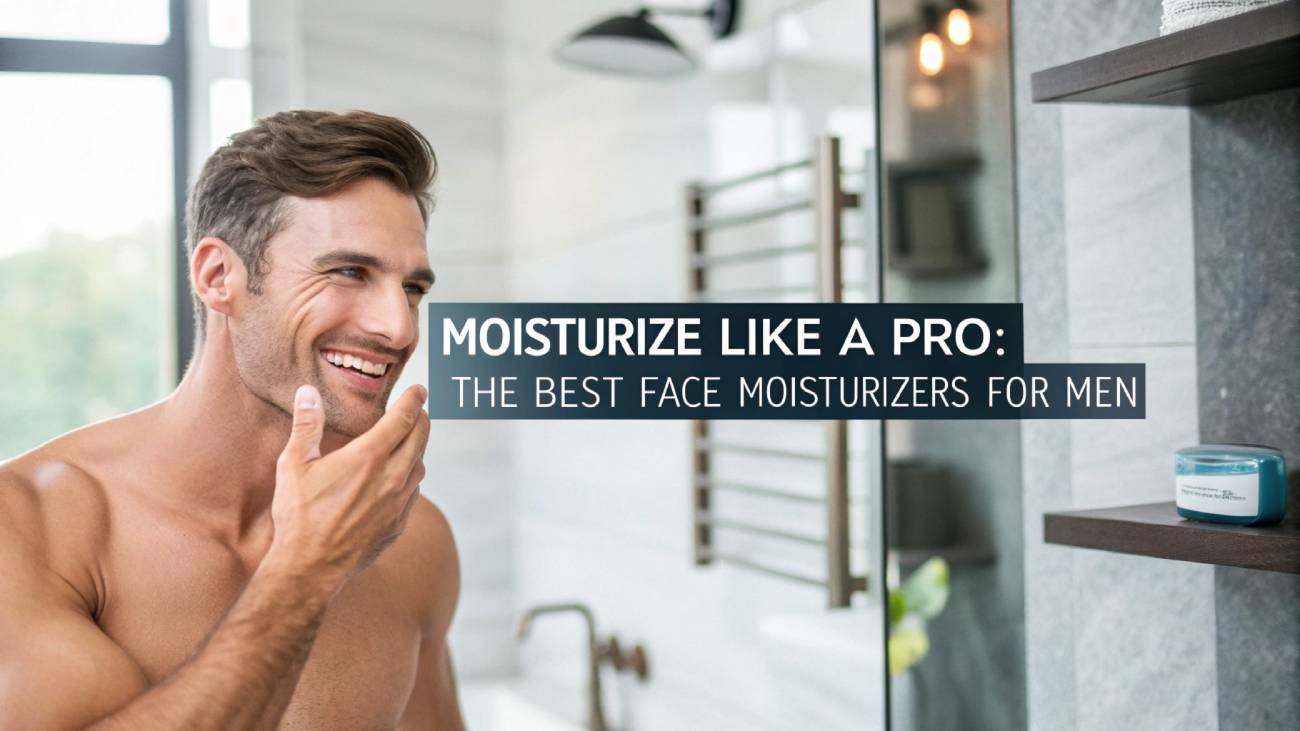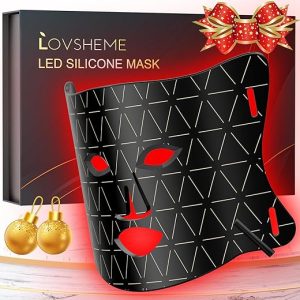In today’s world, the importance of skincare for men cannot be overstated. Breaking long-held stereotypes, more men are recognizing that taking care of their skin is not just a feminine pursuit but an essential aspect of overall health and grooming.
Incorporating a proper skincare routine, starting with a quality face moisturizer, offers numerous benefits. Moisturizing hydrates the skin, providing essential moisture that keeps it soft and supple. It also acts as a protective barrier against environmental aggressors like pollution and harsh weather, safeguarding the skin from damage.
Additionally, regular use of a good moisturizer can significantly improve the appearance of the skin, reducing signs of aging such as wrinkles and fine lines, and promoting a healthier, more vibrant complexion.
Navigating the vast array of face moisturizers available on the market can be overwhelming for men who are new to skincare or looking to upgrade their routine. This article aims to guide men in choosing the best face moisturizers tailored to their unique skin types and concerns.
Whether you have oily, dry, sensitive, or combination skin, understanding what to look for in a moisturizer is crucial for achieving optimal skin health. Beyond product recommendations, we will provide expert tips for establishing effective moisturizing routines that fit seamlessly into your daily life.
By the end of this guide, you’ll be equipped with the knowledge and confidence to moisturize like a pro, ensuring your skin stays hydrated, protected, and looking its best.
Understanding Men’s Skin
Characteristics of Men’s Skin
Men’s skin differs from women’s in several key ways, which influences how it responds to skincare products and environmental factors. Understanding these differences is crucial for selecting the most effective moisturizers.
- Thicker and Oilier Skin On average, men’s skin is about 25% thicker than women’s due to higher collagen density. This increased thickness contributes to a more robust barrier against external aggressors but also means that men’s skin tends to produce more oil. The higher sebum production can lead to a shinier complexion and a greater likelihood of clogged pores, making it essential to choose moisturizers that balance hydration without adding excess oil.
- Higher Collagen Density Men generally have a higher collagen density, which provides greater firmness and resilience. However, as men age, collagen production decreases, leading to the development of wrinkles and fine lines. Utilizing moisturizers with collagen-boosting ingredients can help maintain skin elasticity and delay the signs of aging.
- Lower pH Levels Men’s skin typically has a lower pH compared to women’s, making it more acidic. This acidity helps protect against harmful bacteria and pollutants but can also make the skin more prone to irritation from harsh skincare products. Selecting moisturizers with a balanced pH is vital to maintain skin health and prevent irritation.
Common Skin Concerns for Men
Men face a variety of skin concerns that differ in severity and type from those commonly experienced by women. Addressing these issues requires targeted skincare solutions.
| Common Skin Concern | Description | Prevalence Among Men |
|---|---|---|
| Acne and Razor Burn | Acne can be exacerbated by shaving, leading to razor burn and irritation. | Affects approximately 40% of men at some point |
| Signs of Aging | Wrinkles, fine lines, and loss of elasticity are common as collagen decreases with age. | Visible in men over 35 |
| Dryness and Sensitivity | Environmental factors and frequent shaving can strip the skin of moisture, causing dryness and sensitivity. | Affects about 30% of men |
- Acne and Razor Burn Shaving is a daily ritual for many men, which can irritate the skin and exacerbate acne. Razor burn, characterized by redness and inflammation, is a common issue that can lead to discomfort and increased susceptibility to infections. Choosing a moisturizer that soothes the skin and contains ingredients to prevent breakouts is essential for maintaining clear and healthy skin.
- Signs of Aging: Wrinkles and Fine Lines As men age, the natural decline in collagen and elastin production results in the formation of wrinkles and fine lines. These signs of aging are often first noticed around the eyes, forehead, and mouth. Incorporating anti-aging moisturizers with ingredients like retinol and peptides can help reduce the appearance of these lines and improve skin firmness.
- Dryness and Sensitivity Exposure to harsh weather conditions, pollution, and frequent shaving can strip the skin of its natural oils, leading to dryness and increased sensitivity. Moisturizers that provide deep hydration and contain soothing agents like aloe vera and chamomile extract are beneficial in restoring moisture and calming irritated skin.

Key Ingredients to Look For
Choosing the right face moisturizer involves understanding the key ingredients that address specific skin needs. Here’s a breakdown of essential components to look for in men’s moisturizers:
Hydrators
Hydrators are fundamental for maintaining skin moisture levels and preventing dryness.
- Hyaluronic Acid Hyaluronic acid is a powerful humectant that can hold up to 1,000 times its weight in water, making it highly effective in retaining moisture within the skin. It helps plump the skin, reducing the appearance of fine lines and creating a smooth, hydrated complexion.
- Glycerin Glycerin attracts moisture from the environment and deeper layers of the skin, ensuring continuous hydration. It also helps strengthen the skin’s natural barrier, protecting against environmental aggressors and preventing moisture loss.
Nourishing Oils and Butters
These ingredients provide essential nutrients and help lock in moisture, ensuring long-lasting hydration.
- Jojoba Oil Jojoba oil closely resembles the skin’s natural sebum, making it an excellent moisturizer that balances oil production without clogging pores. It also has anti-inflammatory properties, which can help soothe irritated skin.
- Shea Butter Shea butter is rich in vitamins A and E, providing deep nourishment and improving skin elasticity. Its emollient properties make it ideal for treating dry and rough skin, offering a protective barrier that retains moisture.
Anti-Aging Components
Ingredients that target the signs of aging by promoting collagen production and skin renewal.
- Retinol Retinol, a derivative of vitamin A, accelerates cell turnover and stimulates collagen production. It effectively reduces the appearance of wrinkles, fine lines, and age spots, promoting a smoother and more youthful complexion.
- Peptides Peptides are short chains of amino acids that signal the skin to produce more collagen and elastin. They help improve skin firmness and elasticity, reducing sagging and fine lines over time.
Sunscreen Agents
Protecting the skin from UV damage is crucial in any skincare routine.
- Broad-Spectrum SPF A broad-spectrum sunscreen protects against both UVA and UVB rays, preventing sunburn, premature aging, and skin cancer. Incorporating SPF into your moisturizer ensures continuous protection throughout the day without the need for an additional product.
Soothing Ingredients
These components help calm irritated skin and reduce redness, making them ideal for sensitive skin types.
- Aloe Vera Aloe vera is renowned for its soothing and anti-inflammatory properties. It helps calm irritated skin, reduce redness, and provide lightweight hydration without feeling greasy.
- Chamomile Extract Chamomile extract is another potent anti-inflammatory agent that helps soothe sensitive and irritated skin. It also possesses antioxidant properties, which protect the skin from free radical damage and promote a healthy complexion.
Table: Key Ingredients and Their Benefits
| Ingredient Category | Key Ingredients | Primary Benefits |
|---|---|---|
| Hydrators | Hyaluronic Acid, Glycerin | Nutrient-rich, oil balanced, protective barrier |
| Nourishing Oils/Butters | Jojoba Oil, Shea Butter | UV protection prevents sunburn and premature aging |
| Anti-Aging Components | Retinol, Peptides | Collagen stimulation, wrinkle reduction, improved elasticity |
| Sunscreen Agents | Broad-Spectrum SPF | Calms irritation, reduces redness, and antioxidant protection |
| Soothing Ingredients | Aloe Vera, Chamomile Extract | Calms irritation, reduces redness, antioxidant protection |
Incorporating these key ingredients into your daily moisturizer can address specific skin concerns and enhance the overall health and appearance of your skin. When selecting a face moisturizer, look for products that combine these ingredients to provide comprehensive care tailored to your unique skin needs.
Types of Face Moisturizers
Choosing the right type of face moisturizer is essential for addressing your specific skin needs. Different formulations cater to various skin types and concerns, ensuring that your skin remains hydrated, protected, and healthy. Here’s a breakdown of the primary types of face moisturizers available for men:
Gel-Based Moisturizers
Ideal For: Oily and acne-prone skin
Characteristics: Lightweight, non-greasy, fast-absorbing
Gel-based moisturizers are perfect for men with oily or acne-prone skin. Their lightweight and water-based formulations provide essential hydration without clogging pores or leaving a heavy residue.
These moisturizers often contain ingredients like hyaluronic acid, which hydrates the skin while maintaining a matte finish. Additionally, gel-based options are typically non-comedogenic, reducing the risk of breakouts and making them suitable for daily use, especially in warmer climates.
Cream-Based Moisturizers
Ideal For: Dry and sensitive skin
Characteristics: Rich, thick, deeply hydrating
Cream-based moisturizers are designed to provide intense hydration, making them ideal for men with dry or sensitive skin. These formulations are typically richer and thicker, containing emollients and occlusives like shea butter and ceramides that help lock in moisture and create a protective barrier against environmental stressors.
Cream-based moisturizers soothe irritation, reduce redness, and restore the skin’s natural moisture balance, making them perfect for use during colder months or in dry climates.
Lotion-Based Moisturizers
Ideal For: Normal to combination skin
Characteristics: Lightweight to medium texture, versatile for daily use
Lotion-based moisturizers offer a balanced approach, making them suitable for men with normal to combination skin. These moisturizers have a lighter texture than creams but provide more hydration than gels, making them versatile for everyday use. They absorb quickly without leaving a greasy residue, making them ideal for use under sunscreen or after shaving.
Lotion-based options often contain a blend of hydrators and nourishing ingredients to maintain skin moisture levels and overall health.
Oil-Based Moisturizers
Ideal For: Very dry or mature skin
Characteristics: Rich, nutrient-dense, excellent for locking in moisture
Oil-based moisturizers are best suited for men with very dry or mature skin who need extra nourishment and moisture retention. These formulations are rich in oils and butter like jojoba oil, argan oil, and shea butter, which provide deep hydration and replenish the skin’s natural oils.
Oil-based moisturizers create a barrier that locks in moisture, preventing dryness and improving skin elasticity. They are particularly beneficial for nighttime routines, allowing the skin to repair and regenerate while you sleep.
Table: Types of Face Moisturizers and Their Benefits
| Moisturizer Type | Ideal For | Key Characteristics | Primary Benefits |
|---|---|---|---|
| Gel-Based | Oily and acne-prone skin | Lightweight, non-greasy, fast-absorbing | Intense moisture soothes irritation, protects |
| Cream-Based | Dry and sensitive skin | Rich, thick, deeply hydrating | Intense moisture, soothes irritation, protects |
| Lotion-Based | Normal to combination skin | Lightweight to medium texture, versatile | Balanced hydration, easy absorption, daily use |
| Oil-Based | Very dry or mature skin | Rich, nutrient-dense, locking in moisture | Deep nourishment, improves elasticity, prevents dryness |
Top Face Moisturizer Recommendations for Men
Selecting the best face moisturizer can significantly enhance your skincare routine, ensuring your skin stays hydrated, protected, and youthful. Here are our top recommendations for face moisturizers tailored to various skin types and needs:

Best Overall Moisturizer
Product Name: Clinique for Men™ Moisturizing Lotion
Key Features and Benefits:
- Balanced Hydration: Provides lightweight yet effective hydration suitable for all skin types.
- Oil-Free Formula: Non-greasy and absorbs quickly, leaving no residue.
- Broad-Spectrum SPF 20: Offers daily sun protection to prevent UV damage and premature aging.
- Fragrance-Free: Ideal for sensitive skin, reducing the risk of irritation.
Best for Oily Skin
Product Name: Neutrogena Hydro Boost Water Gel
Key Features and Benefits:
- Hyaluronic Acid: Delivers intense hydration without adding oiliness.
- Oil-Free and Non-Comedogenic: Prevents clogged pores and breakouts.
- Lightweight Gel Texture: Perfect for layering under sunscreen or after shaving.
- Refreshes and Revitalizes: Leaves skin feeling cool and hydrated throughout the day.
Best for Dry Skin
Product Name: Kiehl’s Facial Fuel Energizing Moisture Treatment for Men
Key Features and Benefits:
- Rich Hydration: Formulated with vitamins C and E to nourish and rejuvenate dry skin.
- Antioxidant Protection: Protects against environmental stressors and free radical damage.
- Non-Greasy Formula: Provides deep moisture without feeling heavy on the skin.
- Refreshing Scent: Subtle fragrance that invigorates the senses without being overpowering.
Best Anti-Aging Moisturizer
Product Name: Brickell Men’s Revitalizing Anti-Aging Cream
Key Features and Benefits:
- Retinol and Peptides: Stimulate collagen production and reduce the appearance of wrinkles and fine lines.
- Natural Ingredients: Includes aloe vera and green tea for soothing and antioxidant benefits.
- Firming Effect: Improves skin elasticity and firmness over time.
- Lightweight Texture: Absorbs quickly, making it suitable for daily use without greasiness.
Best Budget-Friendly Option
Product Name: Cetaphil Daily Hydrating Lotion
Key Features and Benefits:
- Affordable Pricing: High-quality hydration at a wallet-friendly price.
- Hyaluronic Acid: Provides long-lasting moisture without breaking the bank.
- Gentle Formula: Suitable for sensitive skin, free from fragrances and parabens.
- Versatile Use: Can be used on both face and body for comprehensive hydration.
Best Natural/Organic Moisturizer
Product Name: Bulldog Skincare Original Moisturizer
Key Features and Benefits:
- 100% Natural Ingredients: Contains aloe vera, camelina oil, and green tea for natural hydration.
- Cruelty-Free and Eco-Friendly: Ethically produced without animal testing.
- Free from Synthetic Additives: No artificial colors, fragrances, or preservatives.
- Sustainable Packaging: Environmentally conscious packaging materials.
Table: Top Face Moisturizer Recommendations for Men
| Category | Product Name | Key Features |
|---|---|---|
| Best Overall | Clinique for Men™ Moisturizing Lotion | Balanced hydration, oil-free, SPF 20, fragrance-free |
| Best for Oily Skin | Neutrogena Hydro Boost Water Gel | Hyaluronic acid, oil-free, non-comedogenic, lightweight gel texture |
| Best for Dry Skin | Kiehl’s Facial Fuel Energizing Moisture Treatment | Rich hydration, vitamins C & E, antioxidant protection, non-greasy |
| Best Anti-Aging | Brickell Men’s Revitalizing Anti-Aging Cream | Retinol, peptides, natural ingredients, firming effect |
| Best Budget-Friendly | Cetaphil Daily Hydrating Lotion | Affordable, hyaluronic acid, gentle formula, versatile use |
| Best Natural/Organic | Bulldog Skincare Original Moisturizer | 100% natural ingredients, cruelty-free, no synthetic additives, sustainable packaging |
Why These Products Stand Out
Each of these moisturizers has been carefully selected based on their formulation, effectiveness, and user reviews. Whether you’re battling oily skin, combating dryness, or seeking anti-aging benefits, there’s a product tailored to meet your specific needs.
Investing in a high-quality moisturizer not only improves your skin’s appearance but also enhances its health and resilience against environmental stressors.
How to Choose the Right Moisturizer
When selecting a face moisturizer, consider your skin type, specific concerns, and lifestyle. Look for products that contain key ingredients suited to your needs, and don’t hesitate to try different formulations to find what works best for you.
Remember, consistency is crucial in any skincare routine, so choose a moisturizer that you’ll enjoy using daily.
How to Choose the Right Moisturizer for Your Skin Type
Selecting the perfect face moisturizer starts with understanding your unique skin type and considering factors such as lifestyle and environment. Here’s a comprehensive guide to help you make an informed decision:
Identifying Your Skin Type
Before choosing a moisturizer, it’s essential to accurately identify your skin type. The four primary skin types are:
- Oily Skin
- Characteristics: Shiny appearance, enlarged pores, prone to acne and blackheads.
- Needs: Lightweight, oil-free formulations that control excess sebum production.
- Dry Skin
- Characteristics: Flaky, rough texture, tightness, and sometimes itchiness.
- Needs: Rich, hydrating moisturizers that provide long-lasting moisture and nourishment.
- Combination Skin
- Characteristics: Oily in the T-zone (forehead, nose, chin) and dry or normal on the cheeks.
- Needs: Balanced moisturizers that address both oily and dry areas without causing breakouts.
- Sensitive Skin
- Characteristics: Redness, irritation, burning or stinging sensations.
- Needs: Gentle, fragrance-free moisturizers with soothing ingredients to calm the skin.
Matching Moisturizer Types to Skin Types
Once you’ve identified your skin type, choose a moisturizer that aligns with your specific needs. Here’s a quick reference table to guide your selection:
| Skin Type | Recommended Moisturizer Type | Key Ingredients to Look For |
|---|---|---|
| Oily Skin | Gel-Based Moisturizers | Hyaluronic Acid, Salicylic Acid |
| Dry Skin | Cream-Based Moisturizers | Shea Butter, Ceramides, Glycerin |
| Combination Skin | Lotion-Based Moisturizers | Niacinamide, Lightweight Oils |
| Sensitive Skin | Oil-Free, Soothing Moisturizers | Aloe Vera, Chamomile Extract, Zinc Oxide |
Considering Lifestyle and Environment
Your daily habits and surroundings play a significant role in determining the best moisturizer for your skin. Consider the following factors:
- Climate
- Hot and Humid: Opt for lightweight, non-greasy moisturizers to prevent excess oiliness.
- Cold and Dry: Choose richer, more emollient formulations to combat dryness and protect against harsh weather.
- Activity Level
- Active Lifestyle: If you exercise regularly, look for non-comedogenic, sweat-resistant moisturizers that won’t clog pores.
- Sedentary Lifestyle: You might prefer more hydrating options that focus on nourishing and repairing the skin.
- Exposure to Pollutants
- Urban Environments: Select moisturizers with antioxidants like Vitamin C and E to protect against free radical damage.
- Rural or Clean Air: Standard moisturizing needs might suffice, but always consider any specific skin concerns.
Table: Choosing the Right Moisturizer Based on Skin Type and Environment
| Factor | Consideration | Moisturizer Recommendation |
|---|---|---|
| Skin Type | Oily, Dry, Combination, Sensitive | Gel-Based, Cream-Based, Lotion-Based, Soothing Types |
| Climate | Hot & Humid vs. Cold & Dry | Lightweight vs. Rich Formulations |
| Activity Level | High Activity vs. Low Activity | Non-Comedogenic, Sweat-Resistant vs. Nourishing |
| Pollutant Exposure | High Pollution vs. Low Pollution | Antioxidant-Rich vs. Standard Moisturizers |
By taking the time to assess your skin type and lifestyle factors, you can select a moisturizer that not only meets your hydration needs but also enhances your skin’s overall health and appearance.
Tips for an Effective Moisturizing Routine
Establishing a consistent and effective moisturizing routine is key to maintaining healthy, vibrant skin. Follow these expert tips to maximize the benefits of your moisturizer:

Proper Application Techniques
- When to Apply: Morning and Night
- Morning: Apply moisturizer after cleansing and before sunscreen to hydrate and protect your skin throughout the day.
- Night: Use a richer moisturizer to replenish and repair your skin while you sleep.
- Amount to Use and How to Apply for Best Absorption
- Quantity: Use a nickel-sized amount for your face. Applying too much can overwhelm the skin and lead to clogged pores.
- Method: Gently massage the moisturizer into your skin using upward, circular motions. Ensure even coverage without tugging or pulling on the skin.
Complementary Skincare Practices
- Cleansing and Exfoliating
- Cleansing: Start with a gentle cleanser to remove dirt, oil, and impurities without stripping your skin of essential moisture.
- Exfoliating: Exfoliate 2-3 times a week to remove dead skin cells and promote cell turnover, enhancing moisturizer absorption.
- Using Serums and Treatments in Conjunction
- Serums: Incorporate serums with active ingredients like Vitamin C or hyaluronic acid before applying your moisturizer for targeted benefits.
- Treatments: Apply treatments such as retinol or acne-fighting agents at night, followed by your moisturizer to lock in benefits and provide additional hydration.
Consistency is Key
- Importance of Regular Moisturizing for Lasting Benefits
- Hydration Maintenance: Consistent moisturizing ensures your skin remains hydrated, preventing dryness and irritation.
- Barrier Protection: Regular use strengthens your skin’s natural barrier, protecting against environmental stressors and reducing the risk of damage.
- Anti-Aging: Consistent application of anti-aging moisturizers can slow down the appearance of wrinkles and fine lines, keeping your skin looking youthful.
Table: Daily Moisturizing Routine for Optimal Skin Health
| Step | Morning | Night |
|---|---|---|
| 1. Cleanse | Use a gentle cleanser to remove impurities | Cleanse thoroughly to remove dirt and sunscreen |
| 2. Exfoliate | (2-3 times a week) Gently exfoliate | (2-3 times a week) Use a chemical exfoliant |
| 3. Apply Serum | Apply Vitamin C serum for antioxidant protection | Apply retinol or other night-time serums |
| 4. Moisturize | Use a lightweight moisturizer with SPF | Apply a richer moisturizer to hydrate overnight |
| 5. Sunscreen | (If not included in moisturizer) Apply SPF 30+ | N/A |
Following a structured and consistent moisturizing routine ensures that your skin stays healthy, hydrated, and resilient against daily stressors.
Common Mistakes to Avoid
Even with the best intentions, certain habits can undermine your skincare efforts. Avoid these common mistakes to ensure your moisturizing routine is as effective as possible:
Skipping Moisturizer
- Consequences of Neglecting Hydration
- Dryness and Flakiness: Lack of moisture can lead to uncomfortable dryness and flaky skin.
- Premature Aging: Dehydrated skin is more prone to developing wrinkles and fine lines.
- Increased Sensitivity: Without proper hydration, the skin’s barrier weakens, making it more susceptible to irritation and environmental damage.
Using the Wrong Type of Moisturizer
- Potential for Clogged Pores or Inadequate Hydration
- Clogged Pores: Using a heavy, oil-based moisturizer on oily or acne-prone skin can clog pores, leading to breakouts.
- Insufficient Hydration: Conversely, using a lightweight gel on very dry skin may not provide the necessary moisture, leaving the skin parched and irritated.
Overusing Products
- Avoiding Product Buildup and Irritation
- Product Buildup: Applying too much moisturizer can create a thick layer that prevents proper absorption, leading to a greasy feel and potential clogging of pores.
- Skin Irritation: Overuse of active ingredients like retinol or acids can cause redness, peeling, and increased sensitivity.
Ignoring Sun Protection
- Importance of Using Moisturizers with SPF
- UV Damage: Exposure to UV rays can cause sunburn, and hyperpigmentation, and accelerate the aging process.
- Skin Cancer Risk: Prolonged sun exposure increases the risk of developing skin cancer.
- Premature Aging: UV radiation breaks down collagen and elastin, leading to sagging and wrinkles.
Table: Common Skincare Mistakes and Their Consequences
| Mistake | Consequences | How to Avoid |
|---|---|---|
| Skipping Moisturizer | Dryness, premature aging, increased sensitivity | Incorporate a daily moisturizing step in your routine |
| Using the Wrong Type | Clogged pores, breakouts, inadequate hydration | Choose a moisturizer that matches your specific skin type |
| Overusing Products | Product buildup, skin irritation, redness | Follow recommended usage guidelines and listen to your skin |
| Ignoring Sun Protection | UV damage, hyperpigmentation, increased cancer risk | Use moisturizers with broad-spectrum SPF 30 or higher daily |
By being aware of these common pitfalls and taking proactive steps to avoid them, you can enhance the effectiveness of your skincare routine and achieve healthier, more resilient skin.
Conclusion
Recap of the Importance of Moisturizing
Maintaining a consistent moisturizing routine is essential for men’s skin health. Moisturizing offers numerous benefits, including:
- Hydration: Keeps the skin supple and prevents dryness and flakiness.
- Protection: Acts as a barrier against environmental aggressors like pollution, UV rays, and harsh weather.
- Improved Appearance: Enhances skin texture, reduces the appearance of wrinkles and fine lines, and promotes a healthy, vibrant complexion.
- Prevention of Premature Aging: Regular moisturizing helps maintain skin elasticity and delays the onset of age-related skin issues.
By understanding and addressing the unique characteristics and concerns of men’s skin, moisturizing becomes a powerful tool in achieving and maintaining optimal skin health.
Investing in quality skincare is a proactive step towards ensuring long-term skin health and appearance. Quality moisturizers tailored to your specific skin type and concerns can make a significant difference in:
- Confidence: Healthy, well-maintained skin boosts self-esteem and overall confidence.
- Health: Proper skincare routines prevent common issues like acne, dryness, and premature aging.
- Cost-Effectiveness: Preventing skin problems reduces the need for expensive treatments and dermatological interventions in the future.
Men are increasingly recognizing the importance of skincare as an integral part of their grooming routines. Embracing quality skincare not only enhances physical appearance but also contributes to overall well-being.
Final Recommendations
To achieve the best results in your skincare journey, consider the following final recommendations:
- Choose the Right Moisturizer: Select a moisturizer that matches your skin type and addresses your specific skin concerns.
- Be Consistent: Apply your moisturizer daily, both morning and night, to maintain hydration and protect your skin.
- Complement Your Routine: Incorporate other essential skincare steps like cleansing, exfoliating, and using serums to maximize benefits.
- Protect Against the Sun: Always use a moisturizer with broad-spectrum SPF to shield your skin from harmful UV rays.
- Experiment and Adjust: Don’t be afraid to try different products to find what works best for your skin. Everyone’s skin is unique, and finding the perfect fit may require some experimentation.
By following these recommendations, you can establish a robust skincare routine that keeps your skin healthy, hydrated, and looking its best.
Additional Resources
Enhance your skincare knowledge and make informed decisions with these additional resources:
Further Reading on Men’s Skincare
- “The Ultimate Guide to Men’s Skincare” – Comprehensive insights into skincare routines tailored for men.
- “Understanding Your Skin Type: A Men’s Guide” – Detailed information on identifying and caring for different skin types.
- “Anti-Aging Skincare for Men: Best Practices and Products” – Strategies and product recommendations to combat signs of aging.
Links to Product Reviews and Comparisons
- Top 10 Men’s Moisturizers Reviewed – In-depth reviews of the best moisturizers for men in 2025.
- Gel vs. Cream: Which Moisturizer is Right for You? – Comparative analysis of different moisturizer types.
- Budget-Friendly vs. Premium Moisturizers: What to Choose? – Guide to selecting moisturizers based on your budget.
Expert Interviews or Testimonials
- “Dermatologist Tips: Essential Skincare for Men” – Expert advice from leading dermatologists on maintaining healthy skin.
- “Real Men, Real Results: Testimonials on Effective Moisturizing Routines” – Success stories and experiences from men who have transformed their skincare routines.
- “Skincare Specialists Discuss the Future of Men’s Skincare” – Insights from industry experts on emerging trends and innovations in men’s skincare.
Frequently Asked Questions (FAQs)
What is the best moisturizer for oily skin?
For oily skin, gel-based moisturizers like Neutrogena Hydro Boost Water Gel are ideal as they provide hydration without adding excess oil or clogging pores.
How often should I moisturize my face?
It’s recommended to moisturize your face twice daily—once in the morning and once before bed—to maintain optimal hydration and protection.
Can men use the same moisturizers as women?
Yes, men can use the same moisturizers as women. However, men’s skin often has different needs, such as higher oil production and thicker skin, so choosing products tailored to these characteristics can yield better results.
Do I need a separate moisturizer if I use sunscreen?
Many moisturizers come with built-in SPF, eliminating the need for a separate sunscreen. However, if your moisturizer doesn’t include SPF, applying sunscreen as an additional step is essential.
What ingredients should I avoid in men’s moisturizers?
Men should avoid moisturizers with harsh fragrances, alcohol, and heavy oils if they have sensitive or oily skin. These ingredients can cause irritation or exacerbate oiliness and breakouts.
Final Thoughts
Maintaining healthy, hydrated skin is not just about aesthetics—it’s a crucial aspect of overall well-being. You can achieve a vibrant and resilient complexion by selecting the right moisturizer tailored to your skin type and following a consistent skincare routine.
Don’t hesitate to invest time and effort into your skincare regimen; the benefits are long-lasting and impactful. Remember, great skin is a reflection of good health and self-care, empowering you to look and feel your best every day.
Main Tips Around the Article
- Identify Your Skin Type: Understanding whether your skin is oily, dry, combination, or sensitive is the first step in choosing the right moisturizer.
- Choose the Right Ingredients: Look for key hydration, nourishing oils, anti-aging components, sunscreen agents, and soothing ingredients that match your skin’s needs.
- Consider Your Lifestyle and Environment: Factors like climate, activity level, and exposure to pollutants can influence the best moisturizer choice.
- Apply Correctly: Moisturize twice daily using the right amount and application technique for optimal absorption and benefits.
- Avoid Common Mistakes: Don’t skip moisturizer, use the wrong type, overuse products, or ignore sun protection to maintain healthy skin.
Recommended Products and Accessories
Enhance your skincare routine with these top-rated products and accessories. Click on the links to explore more and make your purchase today!
- Clinique for Men™ Moisturizing Lotion
- Description: Balanced hydration with oil-free, SPF 20 protection. Perfect for all skin types.
- Buy Now
- Neutrogena Hydro Boost Water Gel
- Description: Lightweight gel with hyaluronic acid, ideal for oily and acne-prone skin.
- Buy Now
- Kiehl’s Facial Fuel Energizing Moisture Treatment for Men
- Description: Rich hydration with vitamins C & E and antioxidant protection for dry skin.
- Buy Now
- Brickell Men’s Revitalizing Anti-Aging Cream
- Description: Contains retinol and peptides to reduce wrinkles and improve skin firmness.
- Buy Now
- Cetaphil Daily Hydrating Lotion
- Description: Affordable, gentle formula with hyaluronic acid, suitable for sensitive skin.
- Buy Now
- Bulldog Skincare Original Moisturizer
- Description: 100% natural ingredients, cruelty-free, and eco-friendly packaging.
- Buy Now
- Exfoliating Scrub for Men by Jack Black
- Description: Gently removes dead skin cells, preparing your skin for better moisturizer absorption.
- Buy Now
- Retinol Serum by The Ordinary
- Description: Effective anti-aging serum that enhances your moisturizer’s benefits.
- Buy Now
- Reusable Facial Cleansing Brush
- Description: Deep cleans pores and enhances the effectiveness of your skincare routine.
- Buy Now
- Sunscreen Spray SPF 50 for Men
- Description: Convenient, non-greasy sun protection to pair with your daily moisturizer.
- Buy Now




















